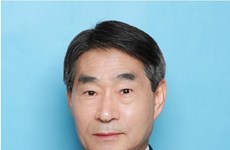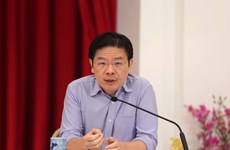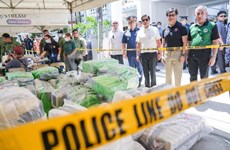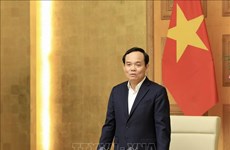East Asia Summit Senior Officials’ Meeting held online
ASEAN countries and partners that are members of the East Asia Summit (EAS) have committed to promoting substantive cooperation to enhance their responsiveness to and minimise the negative impacts of the COVID-19 pandemic.
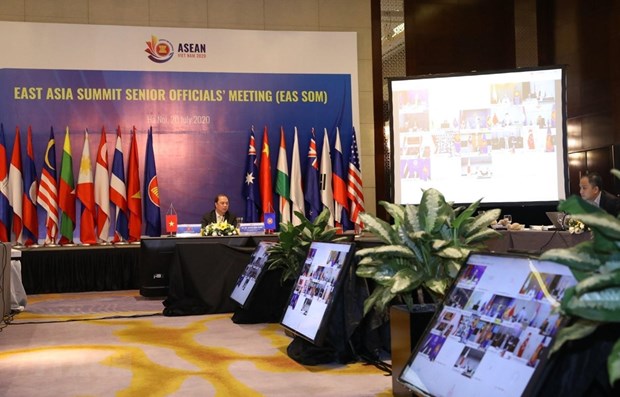 Deputy Foreign Minister Nguyen Quoc Dung chairs the meeting. (Photo: VNA)
Deputy Foreign Minister Nguyen Quoc Dung chairs the meeting. (Photo: VNA)Hanoi (VNA) - ASEAN countries and partners that are members of the East Asia Summit (EAS) have committed to promoting substantive cooperation to enhance their responsiveness to and minimise the negative impacts of the COVID-19 pandemic.
They made the pledge at the teleconferenced EAS Senior Officials’ Meeting late on July 20, chaired by Deputy Foreign Minister Nguyen Quoc Dung from Vietnam, which is Chair of ASEAN and the EAS in 2020.
The summit was attended by representatives from the ten ASEAN members together with Australia, China, India, Japan, New Zealand, the Republic of Korea, Russia, and the US, along with an ASEAN Deputy Secretary-General.
Participating countries reaffirmed that the EAS is a forum for regional leaders to discuss strategic regional issues. They agreed to press on with current priority areas of cooperation, including the environment, energy, education, finance, healthcare, disease outbreak response, disaster management, connectivity, economy, trade, food security, and maritime cooperation.
On the occasion of the EAS’s 15th founding anniversary, ASEAN and its partners in the forum agreed to work closely to devise directions for enhancing EAS’s role in the new circumstances, thus actively contributing to dialogue and cooperation to maintain peace, security, prosperity, and an effective response to emerging challenges in the region.
In particular, they unanimously supported several proposed documents to be tabled at the 15th EAS, slated for October, which deal with celebrating the EAS’s 15th anniversary, enhancing sustainable maritime cooperation, promoting stable regional economic growth, and women’s role in ensuring peace and security.
The EAS partners affirmed that they attach importance to ASEAN’s central role in the regional architecture and highly value Vietnam’s ASEAN Chairmanship in coordinating the bloc and its partners’ efforts to boost cooperation in response to COVID-19, such as the establishment of the ASEAN COVID-19 Response Fund and a regional stockpile of medical supplies.
Meanwhile, ASEAN asked its partners to help it improve capacity in preventive medicine while coordinating closely in information and experience sharing, the development and production of COVID-19 vaccines and medicine, the recovery and maintenance of economic connectivity, and the promotion of sustainable growth.
Countries also discussed regional and international issues of shared concern, including the situation on the Korean Peninsula and in the East Sea, Rakhine State in Myanmar, and Hong Kong in China.
Regarding the East Sea issue, they emphasised the importance of peace, stability, security, safety, and freedom of navigation and aviation in the waters, which are of common interest to all.
Participants voiced concerns about recent developments in the waters, which they said have negatively affected peace, security, and the rule of law in the region.
They stressed the necessity to promote dialogue and trust building; to refrain from actions that can escalate tensions or complicate the situation, militarisation, or the use of or threat to use force; and to resolve disputes by peaceful means on the basis of international law, including the 1982 UN Convention on the Law of the Sea (UNCLOS).
The countries also called on ASEAN and China to fully and effectively implement the Declaration on the Conduct of Parties in the East Sea (DOC) and strive to soon finalise an effective Code of Conduct (COC) that matches international law and are recognised by the international community.
During the event, Deputy Foreign Minister Nguyen Quoc Dung underlined the need to promote the EAS Chair’s coordinating role in cooperation activities; improve coordination and complementarity between the EAS and other ASEAN-led mechanisms like the ASEAN Plus Three, the ASEAN Regional Forum, and the Expanded ASEAN Maritime Forum; and foster the EAS’s role in responding to emerging challenges in the region.
In terms of the East Sea issue, he stressed the principled stance stated at the 36th ASEAN Summit, asking relevant parties to respect law, exercise self-restraint, not take actions that complicate the situation, not carry out militarisation activities, and to settle disputes by peaceful means.
The officials underscored the need to continue the full and effective implementation of the DOC and to strive to overcome pandemic-induced difficulties so as to quickly finalise an efficient and effective COC that is in line with international law, in particular the 1982 UNCLOS, thus contributing to peace, security, and stability in the East Sea and the region./.









